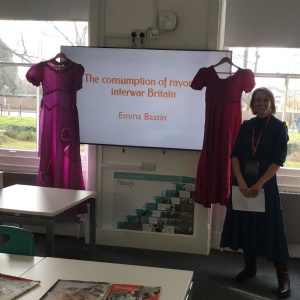
History Society Speaker, Emma Bastin
Published on 20/04/23

Emma Bastin, Dr. to-be, came in to talk to Stephen Perse Sixth Form on invitation from the Sixth Form History Society about her PhD. It turned out to be a huge treat.
We weren’t really sure what to expect -the title of the talk was: ‘The consumption of rayon in interwar Britain’. This was an optional talk for Sixth Form students, and those that came were truly delighted.
Leon said: “It was really interesting and refreshing to come at the era from the whole perspective of clothes”. The social aspect of history and society was an angle that he hadn’t considered before, and so it was interesting to see that period from a consumer perspective. Tereza was keen to make parallels to today’s society. How fun it was to compare the fast fashion of today with its birthplace in the 1930s. The impact of rayon as a fabric on how ladies bought clothes and indeed went shopping with a more disposable income was quite contrary to our traditional understanding of interwar England. Suddenly, they had money that they could use to buy a whole dress rather than just buy one dress a year. Jessie was fascinated by the way that Mrs Bastin brought in how shopping has evolved since the Victorian era. Consumerism and shopping generally today has a history of its own.
Emma Bastin had examples of 1930s Rayon fabric dresses with her which the students could touch and see. Similarly she had bought magazines from the period illustrating what her PhD focused on. There was time for her to discuss with the students the details involved in working on a PhD. There was time for a few questions at the end but this was a talk where the students did not want her to stop and in fact had more questions than time permitted. We are incredibly grateful to her for giving up her time and sharing her knowledge with us all.
Florence was wary that the language academics use can be hard for students to fully engage with but this talk was accessible and enlightening in terms of how rayon kick started the consumer economy that we have today. On behalf of the Stephen Perse History Society we wish Emma Bastin the best of luck in receiving her PhD.